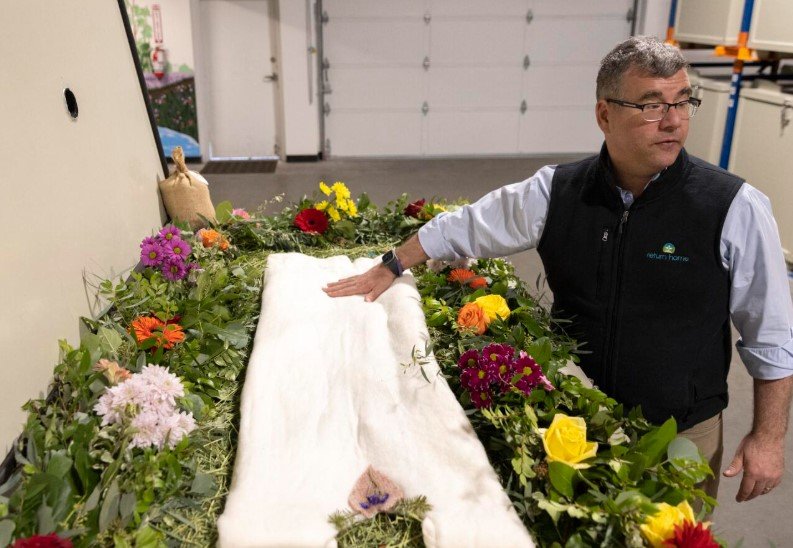A recent bill signed by Georgia Governor Brian Kemp will make the state one of just 13 in the U.S. to legalize human composting, a practice that supporters believe will change the way the state handles death. The law, set to take effect on July 1, will offer families an eco-friendly alternative to traditional burial or cremation, allowing deceased loved ones to be turned into nutrient-rich soil.
A Sustainable Alternative Gaining Popularity
As the demand for greener options continues to rise, human composting, also known as terramation, has emerged as a sustainable way to return the body to the earth. This method accelerates natural decomposition through organic materials such as wood chips, straw, and alfalfa. The process results in nutrient-dense soil that can be used to nourish plants, trees, and gardens or even support environmental conservation efforts.
“People are looking for ways to stay connected to their loved ones long after they are gone,” said Michelle Arivette, a funeral director at AS Turner and Sons in DeKalb County. “We’re seeing a lot of people interested in planting a memorial garden or even spreading the soil over the yard where their loved one spent a lot of time.” The practice not only promises to be environmentally responsible but also deeply personal for those left behind.
A Growing Movement Across the U.S.
Georgia’s move to legalize human composting follows a trend seen across the U.S., especially in the West, where states like Washington and Oregon have led the charge in offering eco-friendly burial alternatives. However, until now, Georgia residents had to travel to these West Coast states for this option, an expensive and logistically challenging process for families. With the passing of this new law, families can now keep the practice local, with composting facilities being established throughout the state.

Recompose, a leading company in the human composting industry based in Washington, has already seen great success with its own facilities. The company’s founder, Katrina Spade, shared her excitement about Georgia’s decision to join the growing trend. “This new green funeral option allows people to return to the earth after they die, nourishing gardens and forests. We are proud to see the movement continue to grow so beautifully,” she stated.
What Is Human Composting and How Does It Work?
Human composting involves placing the body in a container filled with organic materials like alfalfa, straw, and wood chips. Over a period of about six to eight weeks, the body naturally decomposes, and the result is a rich, fertile soil that families can use for gardening or conservation efforts.
The process, which is much faster than traditional burial, mimics the natural decomposition that occurs in the earth but speeds it up using controlled conditions. The body is placed in a shroud and laid inside a vessel, where it is surrounded by organic materials. These materials break down the body, creating nutrient-rich soil that is free from harmful chemicals or pollutants.
This method of body disposal is not just about returning the body to the earth—it’s also about reducing the environmental impact of traditional burial and cremation methods, which can involve harmful chemicals like embalming fluid or contribute to carbon emissions.
Public Support and Growing Demand
As people become more environmentally conscious, the demand for green burials and composting options has surged. In Georgia, many residents are already familiar with green burial options like natural burial grounds, where bodies are interred without embalming or caskets, but human composting takes this a step further by turning the deceased into something that can benefit the environment.
While traditional funerals and burials continue to be the norm in many parts of the U.S., experts say that attitudes are shifting. People, especially younger generations, are looking for ways to reduce their environmental footprint, even in death. And, with the rise in interest for eco-friendly practices, human composting is expected to become an increasingly popular choice across the nation.
What This Means for Georgia’s Funeral Industry
With the new law in place, Georgia’s funeral industry is expected to see a wave of new businesses and partnerships emerging to cater to this demand. Arivette’s funeral home is already collaborating with Recompose, one of the first companies to offer human composting in the U.S., and other businesses are expected to follow suit. The passage of this bill opens up new opportunities for funeral homes to diversify their services and for the state to lead in innovative, sustainable funeral options.
Funeral homes across Georgia are now looking into the logistics of offering composting as a service, including the setup of composting vessels, the legalities of transporting bodies, and creating systems that align with state regulations. This could be a vital step for the funeral industry, as families look for personalized and meaningful ways to honor their loved ones while also benefiting the environment.
The Future of Human Composting in the U.S.
As Georgia joins the ranks of states offering human composting, more states are likely to follow suit. With growing environmental concerns, people are pushing for more sustainable ways to handle death and burial. Human composting offers a viable alternative that reduces carbon footprints, creates valuable soil, and provides families with a unique, lasting tribute to their loved ones.
As more states legalize the practice and more funeral homes and composting facilities are built, the landscape of death care in the U.S. is poised for a major transformation. Human composting is not just a trend—it’s a movement toward a more eco-conscious, sustainable future for death and burial.
